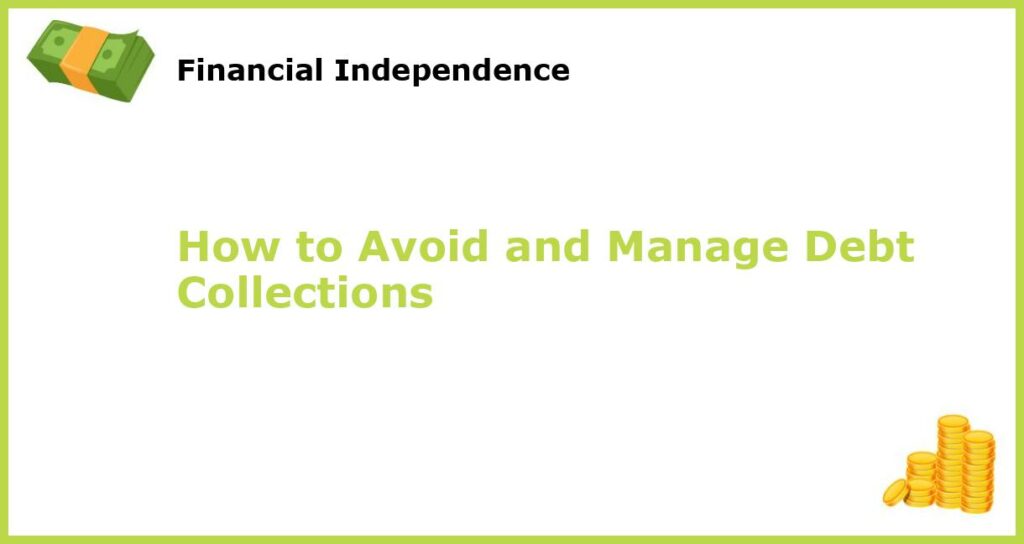Debt collections can be intimidating, stressful, and can have a damaging effect on your credit score. But the good news is, there are ways to avoid and manage debt collections. Here’s how:
Assess Your Debt Situation

Assessing your debt situation is the first step you need to take to avoid and manage debt collections. You need to gather all your debt-related information, such as the amount you owe, the interest rate, and the due dates. Once you have all this information, you can come up with a debt repayment plan. Start by listing all your debts, starting from the smallest to the largest. Then, determine how much money you can allocate to pay off your debts each month. By doing this, you’ll be able to come up with a plan that works for you, and you can avoid being sent to debt collections.
Communicate with Your Creditors

If you are struggling with debt payments and can’t afford to make your payments on time, it’s crucial to communicate with your creditors. Ignoring their calls and letters will only worsen the situation and can lead to your account being sent to debt collections. You can reach out to your creditors and explain your situation. They might be able to offer you a repayment plan that works for you. You can explain why you’re struggling to make the repayments, and if you have a plan, you can discuss it with them. In most cases, they’ll be willing to work with you and avoid sending your account to debt collections.
Create a Budget Plan

A budget plan can help you avoid being sent to debt collections. It involves setting aside money for your repayments, prioritizing your essential expenses, and avoiding unnecessary spending. Start by reviewing your monthly expenses and identifying the necessary expenses, such as rent and utilities. Then, look at your discretionary expenses, such as food and entertainment, and see if you can cut back on them. Once you’ve made a budget, stick to it and avoid accumulating more debts, which can lead to more debt collection actions.
Explore Debt Consolidation Options

Debt consolidation can help you avoid debt collections by combining several debts into one monthly payment. Consolidating your debts can lower your interest rates and make your debt more manageable. Research and explore debt consolidation options that might work for you, such as a personal loan or a balance transfer credit card. However, before choosing a consolidation option, make sure you understand the terms and conditions of the loan, including the interest rates and fees associated with it.
Consider Credit Counseling

Credit counseling can help you avoid debt collections by working with a professional to develop a debt management plan. Credit counseling organizations can help you set up affordable repayment terms and negotiate with your creditors on your behalf. Consider credit counseling if you’re overwhelmed with your debt situation. However, be careful when choosing a credit counseling agency, as not all organizations are legitimate. Do your research and choose a reputable agency.
Respond to Debt Collection Notices

If you receive a notice from a debt collector, don’t ignore it. Respond promptly to avoid further collection actions. Review the notice and ensure that the debt is yours and you owe the amount claimed. If you doubt the debt’s validity, you can request more information from the debt collector. If they fail to provide you with sufficient information or you believe the debt is not valid, you have the right to dispute it. The debt collector must stop all collection activities until they provide proof that the debt is yours.
Negotiate with Debt Collectors

If you cannot afford to pay your debts in full, don’t panic. Negotiate with the debt collector to work out a repayment plan that suits your current financial situation. You can explain your financial situation to the collector and suggest a payment plan that works for you. Ensure that you receive a written agreement that outlines the repayment terms to avoid any misunderstandings.
Know Your Rights

It’s essential to know your rights when dealing with debt collectors. The Fair Debt Collection Practices Act (FDCPA) protects consumers from unlawful debt collection practices. The FDCPA prohibits debt collectors from using abusive, unfair, or deceptive practices to collect debts from consumers. Be aware of your rights and report any violations to the relevant agencies.
Get Professional Legal Help
If you’re facing a debt collection lawsuit, it’s crucial to seek professional legal help. A lawyer can help you navigate the legal process and negotiate a settlement with the creditor or the debt collection agency. A legal professional can help you understand your rights and obligations, and provide you with legal representation if you need it. Debt collection agencies often have legal teams, so it’s best to have someone on your side who knows the law and can provide you with legal counsel.
Take Control of Your Debt
The ultimate solution to avoiding and managing debt collections is to take control of your debt. Develop good financial habits, such as living within your means, paying your debts on time, and prioritizing your essential expenses. It would help if you also built an emergency fund to cover unexpected expenses. By taking control of your debt, you can avoid debt collections and achieve financial stability. Remember that it takes discipline and patience to get out of debt, but the reward is worth it.







